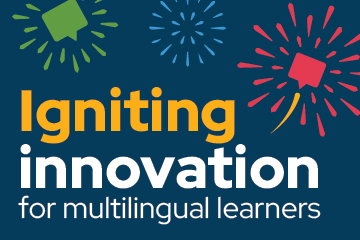Resources/Recursos
Featured Resources



All resources/Todos los recursos
Filter resources by:
Resources/Recursos
Less Than Four Domains: Creating an Overall Composite Score for English Learners with Individualized Education Plans
The analysis in this report illustrates models and procedures that can be used to assign a missing domain score in order to calculate an overall composite score. These methods only apply to assessments taken by English learners whose IEPs or 504 plans require they not be tested in one or more domains.
Resource Details View Download NowReleased March 2019
Investigating K-12 English Learners' Use of Universal Tools Embedded in Online Language Assessments
This study examined how English learners in Grades 1-12, with and without disabilities, used online accessibility features during an ELP assessment. These accessibility features are designed to provide the necessary support for the general EL population, including ELs with disabilities.
Published March 2019
Authors: Ahyoung Alicia Kim, Meltem Yumsek, Mark Chapman, H. Gary Cook
Released March 2019
ABCs of Family Engagement
This guide presents six key considerations for strengthening family engagement practices and building relationships with families.
Resource Details View Download NowReleased February 2019
Long-term English Learners across 15 WIDA States
This research brief presents findings and policy implications from a recent research study exploring the so-called long-term English learner (LTEL) population across WIDA states. The findings highlight a continuing need for research that rejects an overly simplistic understanding of the LTEL designation. The next phase of this research will use student- and school-level data from three states to examine how individual and school factors can affect the diverse trajectories of ELs’ language development over time.
Published January 2019
Resource Details View Download NowReleased January 2019
Understanding Language Proficiency to Develop Language Goals, Grades 6-12
These lesson plans (with accompanying worksheets) guide grades 6-12 students in understanding language proficiency, determining their own strengths, and setting goals for language development.
Resource Details View Download NowReleased December 2018
Understanding Language Proficiency to Develop Language Goals, Grades K-5
These lesson plans (with accompanying worksheets) guide grades K-5 students in understanding language proficiency, determining their own strengths, and setting goals for language development.
Resource Details View Download NowReleased December 2018
Choosing an Interim Assessment: Guidelines for Stakeholders
This document describes WIDA's viewpoint of the criteria for an assessment to be used as a valid interim English language proficiency assessment in support of the annual administration of ACCESS for ELLs.
Resource Details View Download NowReleased November 2018
Exploring the Long-term English Learner Population Across 15 WIDA States
This research report summarizes findings from a recent WIDA study exploring the potential long-term English learner (LTEL) population across 15 geographically-representative WIDA member states during the period 2009-10 through 2014-15. The findings highlight a continuing need for research that rejects an overly simplistic understanding of the LTEL designation. Additionally, future research should more carefully examine how educational systems, practices, and policies structure the experiences and diverse trajectories of students identified as LTELs.
Published October 2018
Authors: Narek Sarakyan and Sarah Ryan
Released October 2018
Can Do Philosophy (Video)
This video provides an overview of the WIDA Can Do Philosophy – the foundational belief that every learner brings valuable contributions to everything they do.
Resource DetailsReleased September 2018
Introduciendo a WIDA
WIDA establece las bases para el éxito un salón de clase a la vez. ¡Estamos conscientes de lo que pueden lograr los estudiantes multilingües y sus educadores! Continuamente establecemos las mejores prácticas en la industria, apoyamos la defensa estudiantil y ofrecemos oportunidades de desarrollo profesional de primera clase para los maestros. ¡Vea cómo lo hacemos!
Detalles del recursoReleased August 2018
Introducing WIDA
WIDA builds the foundations of success one classroom at a time. We know what multilingual students and their educators can do! We continually establish the industry’s best practices, support student advocacy and offer second to none professional development opportunities for teachers. Watch how we work!
Resource DetailsReleased August 2018
WIDA English Language Development Standards and Resource Guide, International Edition
WIDA intends to fully retire the WIDA English Language Development Standards and Resource Guide, International Edition: Kindergarten-Grade 12. However, we recognize that schools have different timelines for implementation of the updated WIDA ELD Standards Framework, 2020 Edition. With that in mind, the earlier International Edition will remain in the Resource Library so that schools that are still using it may access it as needed.
The international edition of the 2012 Amplification of the WIDA English Language Development Standards was developed in response to growing interest from educators outside the U.S. for standards and assessments that can support and document the development of academic English among their students.
The 2012 ELD Standards Framework represented the social, instructional and academic language that students need to engage with peers, educators, and the curriculum in schools and included examples of how language is processed or produced within a particular context through Model Performance Indicators (MPIs). MPIs were meant to be examples and not fixed guidelines of the language with which students may engage during instruction and assessment.
Resource Details View Download NowReleased August 2017
Los descriptores Podemos: educación temprana
Los descriptores Podemos (Podemos) ofrecen ejemplos de lo que los hablantes del español podemos realizar en cada uno de los niveles de desempeño lingüístico y en las cuatro formas de lenguaje: leer, escuchar, hablar y escribir.
Detalles del recurso Ver Descargar ahoraReleased April 2017
STEM Discourse
This WIDA Focus Bulletin explores ways to strengthen reasoning and language in Science, Technology, Engineering, and Mathematics (STEM) education.
Published January 2017
Author: Rita MacDonald
Released April 2017
Including Recently Arrived English Learners in State Accountability Systems: An Empirical Illustration of Models
Based on a U.S. Department of Education guide, these model analyses illustrate procedures a state could use to compare and contrast school-level overall and English learner accountability determinations for proficiency in reading/language arts. These examples are provided only to illustrate how a state could undertake them as part of its efforts to develop and explore a theory of action for assessment of recently arrived English learners.
Resource DetailsReleased March 2017
2012 Amplification of the WIDA English Language Development Standards
The 2012 Amplification of the WIDA English Language Development Standards, Kindergarten-Grade 12, represented the social, instructional, and academic language students might need to engage with peers, educators, and the curriculum in schools. The 2012 Amplification included examples of how language could be processed or produced within a particular context through Model Performance Indicators (MPIs). MPIs were meant to be examples and not fixed guidelines of the language with which students may have engaged during instruction and assessment.
WIDA intends to fully retire the 2012 Amplification of the WIDA English Language Development Standards, Kindergarten-Grade 12. However, we recognize that all member SEAs have different timelines for implementation of the WIDA ELD Standards Framework, 2020 Edition. With that in mind, the 2012 Amplification will remain in the Resource Library so that educators whose SEAs are still using it may access it as needed.
Resource Details View Download NowReleased March 2017
Providing ELLs with Disabilities Access to Complex Language
This WIDA Focus Bulletin outlines ways in which educators can provide English Language Learners with disabilities access to complex language via classroom activities and engagement opportunities.
Published March 2017
Authors: Lynn Shafer Willner, Cynthia Lundgren, Mira Monroe, Julia Cortada
Released February 2017
Getting Students Ready for ACCESS for ELLs Paper
General advice to teachers who want to help prepare their students to take ACCESS for ELLs Paper.
Resource Details View Download NowReleased November 2016
Performance Definitions - Expressive Domains
This document contains the performance definitions for the expressive domains of speaking and writing.
Resource Details View Download NowReleased November 2016
Performance Definitions - Receptive Domains
This document contains the performance definitions for the receptive domains of listening and reading.
Resource Details View Download NowReleased November 2016




